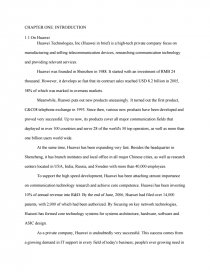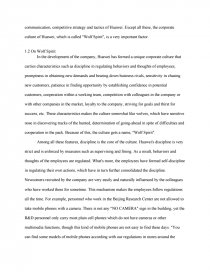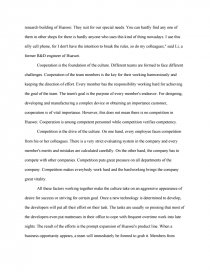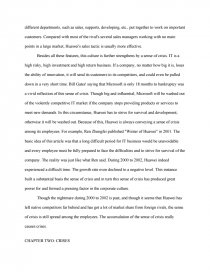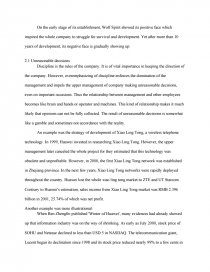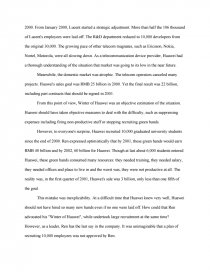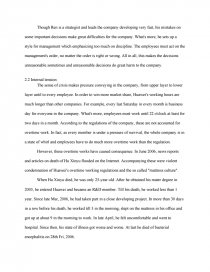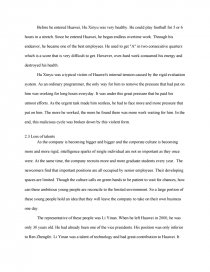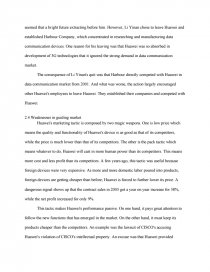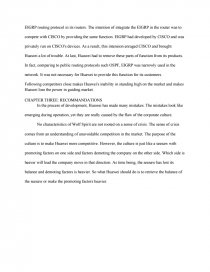Huawei Technologies - Corporate Culture
Essay by william.tiger • May 18, 2013 • Case Study • 3,078 Words (13 Pages) • 2,334 Views
CHAPTER ONE: INTRODUCTION
1.1 On Huawei
Huawei Technologies, Inc (Huawei in brief) is a high-tech private company focus on manufacturing and selling telecommunication devices, researching communication technology and providing relevant services.
Huawei was founded in Shenzhen in 1988. It started with an investment of RMB 24 thousand. However, it develops so fast that its contract sales reached USD 8.2 billion in 2005, 58% of which was marked in overseas markets.
Meanwhile, Huawei puts out new products unceasingly. It turned out the first product, C&C08 telephone exchange in 1993. Since then, various new products have been developed and proved very successful. Up to now, its products cover all major communication fields that deployed in over 100 countries and serve 28 of the world's 50 top operators, as well as more than one billion users world wide.
At the same time, Huawei has been expanding very fast. Besides the headquarter in Shenzheng, it has branch institutes and local office in all major Chinese cities, as well as research centers located in USA, India, Russia, and Sweden with more than 40,000 employees.
To support the high speed development, Huawei has been attaching utmost importance on communication technology research and achieve core competence. Huawei has been investing 10% of annual revenue into R&D. By the end of June, 2006, Huawei had filed over 14,000 patents, with 2,000 of which had been authorized. By focusing on key network technologies, Huawei has formed core technology systems for systems architecture, hardware, software and ASIC design.
As a private company, Huawei is undoubtedly very successful. This success comes from a growing demand in IT support in every field of today's business, people's ever growing need in communication, competitive strategy and tactics of Huawei. Except all these, the corporate culture of Huawei, which is called "Wolf Spirit", is a very important factor.
1.2 On Wolf Spirit
In the development of the company, Huawei has formed a unique corporate culture that carries characteristics such as discipline in regulating behaviors and thoughts of employees, promptness in obtaining new demands and bearing down business rivals, sensitivity in chasing new customers, patience in finding opportunity by establishing confidence in potential customers, cooperation within a working team, competition with colleagues in the company or with other companies in the market, loyalty to the company, striving for goals and thirst for success, etc. These characteristics makes the culture somewhat like wolves, which have sensitive nose in discovering tracks of the hunted, determination of going-ahead in spite of difficulties and cooperation in the pack. Because of this, the culture gets a name, "Wolf Spirit".
Among all these features, discipline is the core of the culture. Huawei's discipline is very strict and is enforced by measures such as supervising and fining. As a result, behaviors and thoughts of the employees are regulated. What's more, the employees have formed self-discipline in regulating their own actions, which have in turn further consolidated the discipline. Newcomers recruited by the company are very easily and naturally influenced by the colleagues who have worked there for sometime. This mechanism makes the employees follow regulations all the time. For example, personnel who work in the Beijing Research Center are not allowed to take mobile phones with a camera. There is not any "NO CAMERA" sign in the building, yet the R&D personnel only carry most plain cell phones which do not have cameras or other multimedia functions, though this kind of mobile phones are not easy to find these days. "You can find some models of mobile phones according with our regulations in stores around the research building of Huawei. They suit for our special needs. You can hardly find any one of them in other shops for there is hardly anyone who uses this kind of thing nowadays. I use this silly cell phone, for I don't have the intention to break the rules, so do my colleagues," said Li, a former R&D engineer of Huawei.
Cooperation is the foundation of the culture. Different teams are formed to face different challenges. Cooperation of the team members is the key for their working harmoniously and keeping the direction of effort. Every member has the responsibility working hard for achieving the goal of the team. The team's goal is the purpose of every member's endeavor. For designing, developing and manufacturing a complex device or obtaining an importance customer, cooperation is of vital importance. However, this does not mean there is no competition in Huawei. Cooperation is among competent personnel while competition verifies competency.
Competition is the drive of the culture. On one hand, every employee faces competition from his or her colleagues. There is a very strict evaluating system in the company and every member's merits and mistakes are calculated carefully. On the other hand, the company has to compete with other companies. Competition puts great pressure on all departments of the company. Competition makes everybody work hard and the hardworking brings the company great vitality.
All these factors working together make the culture take on an aggressive appearance of desire for success or striving for certain goal. Once a new technology is determined to develop, the developers will put all their effort on their task. The tasks are usually so pressing that most of the developers even put mattresses in their office to cope with frequent overtime work into late nights. The result of the efforts is the prompt expansion of Huawei's product line. When a business opportunity appears, a team will immediately be formed to grab it. Members from different departments, such as sales, supports, developing, etc., put together to work on important customers. Compared with most of the rival's several sales managers working with no main points in a large market, Huawei's sales tactic is usually more effective.
Besides all these features, this culture is further strengthens by a sense of crisis. IT is a high risky, high investment and high return business. If a company, no matter how big it is, loses the ability of innovation, it will send its customers to its competitors, and could even be pulled down in a very short time. Bill Gates' saying that Microsoft is only 18 months to bankruptcy was a vivid reflection of this sense of crisis. Though big and influential, Microsoft will be washed out of the violently competitive IT market if the company stops providing products or services to meet new demands. In this circumstance, Huawei
...
...
